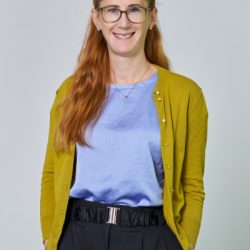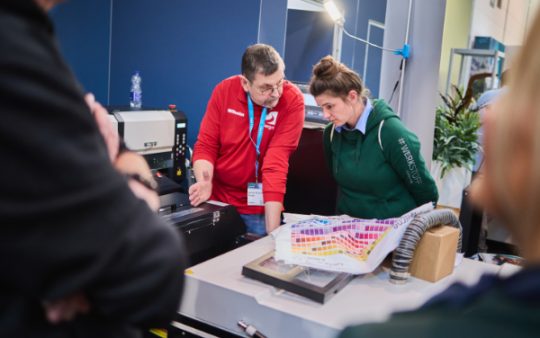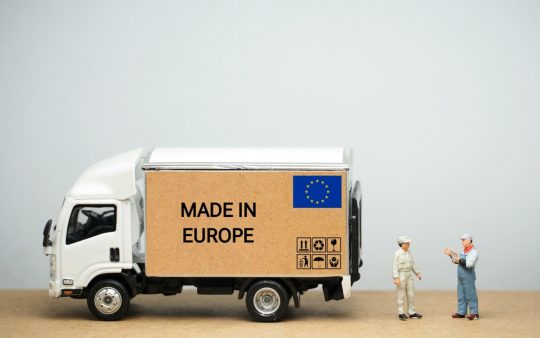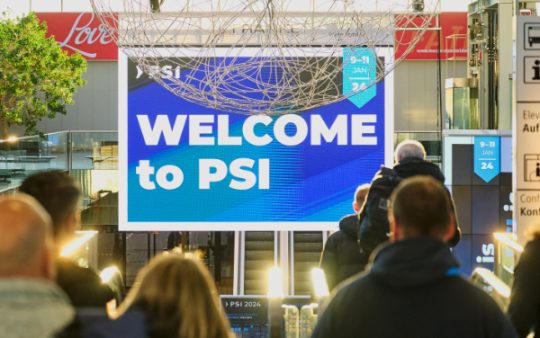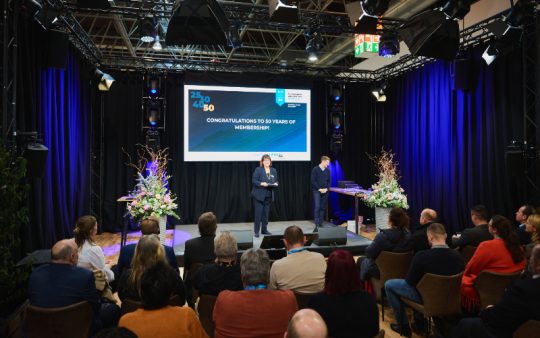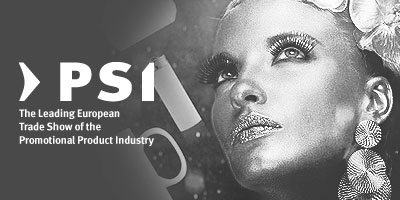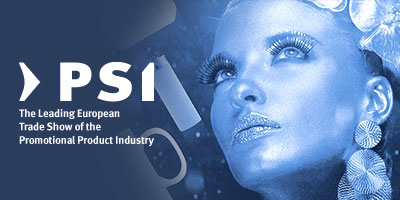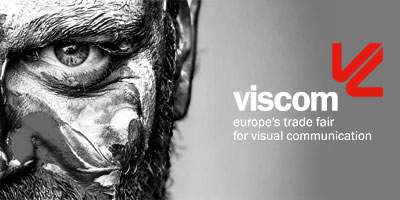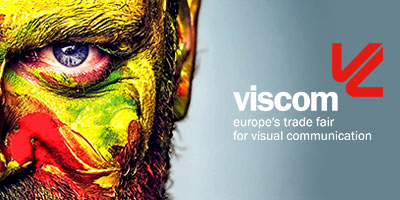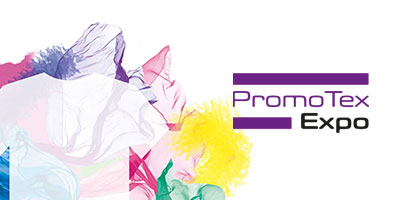Astrid Schulte: "Our centrepiece has always been the small customer business. But merchandise has enormous potential."

Published on 15.07.2024
Berendsohn Werbeartikel is currently expanding its portfolio to include merchandising for large companies. We spoke to CEO Astrid Schulte about her milestones and visions for the long-established company.
You worked for Roland Berger, Cartier and Payback, among others, for many years and learnt a lot about how companies work. What has particularly shaped you?
Astrid Schulte: „Before I became an entrepreneur, I had many good, but also negative experiences. Born in ’65, I started working in the early 90s and got to know many structures with dominance and subordination. In my opinion, people in these systems were too preoccupied with politics and self-promotion, so that both the content and the human element fell by the wayside. I myself worked 80 hours a week for many years and often felt exhausted and uninspired. I am sure that such systems do not get the best out of employees. I am more convinced of the opposite: if people are at the centre, their resources are the most important asset in the company, their strengths are seen and promoted and they are managed as equals, then the most important prerequisites for top performance are fulfilled.“
That sounds like an intense time. What finally led you to become an entrepreneur?
Astrid Schulte: „At some point, I realised that these structures didn’t suit me. I wanted to work differently myself and organise companies in such a way that people are strengthened and empowered to get the best out of themselves. At the same time, I started my ‘inner career’ and defined for myself what fulfilment and success meant to me. In combination with being a mother, I became an entrepreneur. After twelve years in my first career, I have now been an entrepreneur for 22 years.“
Can you tell us more about your first entrepreneurship experience?
Astrid Schulte: „With Bellybutton, I learnt how great it is to be able to create things yourself. Our team was made up of wonderful people who were all passionate about the mission of supporting women in the situation of pregnancy or motherhood to make life easier and more self-confident. It was liberating to focus solely on the employees and the challenges of the content. There was a flow, a magic that was felt by everyone involved with our brand. I led the way I would have liked to have been led in my first career. Bellybutton went well, we sold it and then I became an entrepreneur at Berendsohn AG.“
How was the transition to Berendsohn and what changes have you made there?
Astrid Schulte: „Together with two friends, I bought the majority of Berendsohn and since then we have been transforming the 190-year-old family business. We weren’t profitable for a few years before 2017, but we’ve been operationally profitable again since 2021. We have turned a lot of things ‘inside out’ in the company: a new vision/mission, an adapted business model, a new definition of cooperation and leadership. We have also digitalised a lot. We now have an expanded range of customers and not only sell analogue promotional gifts, but also entire marketing concepts with products for digital visibility (website, local listing, SEO, SEA and much more). We are also expanding a new business area.“
What is this new business area?
Astrid Schulte: „In the near future, we will take over the entire merchandising business for large companies. We have already on-boarded a major customer and another one is planned for this year. This step was very obvious, as we have mastered the entire value chain for many years; from product selection, design and purchasing to finishing and logistical services, we take care of everything for the companies. We are thus solving a major challenge for them.“
What exactly do you offer this major company?
Astrid Schulte: „Every company has the challenge of managing merchandising articles. Employees or customers should receive welcome packages, for example, or gifts for birthdays or anniversaries. Items should be retrieved worldwide, employees should be authorised to retrieve them. Stocks of merchandising items also need to be managed and repeat orders need to be placed. We take over the entire process for our customers in a completely digitalised way, thereby reducing complexity, costs and work for them.“
How does this fit into your existing business model?
Astrid Schulte: „Our core business has always been the small customer business, and that remains the majority of our business. But merchandising has enormous potential – even for larger companies. We utilise the majority of the value chain already in use. Many companies have commissioned agencies or have their own warehouses full of branded items, which often leads to a lack of transparency. Branded products are important marketing tools that need to be managed professionally.“
Can you give us some examples of the complexity of merch management?
Astrid Schulte: „The aforementioned onboarding packages are a true classic. Everything has to fit together, from the product selection, the size of the textiles, the logo colour to the look and feel – often even individually personalised. The packages have to be assembled and dispatched worldwide at the right time. In many organisations, marketing or HR departments have to send these things manually.“
That sounds like a very comprehensive service. How do your customers react to this?
Astrid Schulte: „The response so far has been very positive. The ability to get everything from one single source and the extra transparency and cost benefits we offer are big plus points. Customers appreciate no longer having to worry about the details and having professional, high-quality products.“
How has your strategy changed since the acquisition in 2017?
Astrid Schulte: „We already had the strategy of making Berendsohn a hybrid marketing service provider for analogue and digital visibility for small and medium-sized companies when we started in 2017. New products have been added, such as an AI product for our customers, which we are launching this autumn. The new business area for key accounts was also not yet foreseeable in 2017. As part of our transformation, we are continuing to digitalise processes, always with a focus on our mission to be the ‘best partner’ for our customers. That’s why we’re sticking to our direct sales approach with conviction; we’re on site if the customer requires it and provide advice with a lot of industry and process experience, just like a marketing agency, only cheaper and more specialised.“
How do you deal with those challenges?
Astrid Schulte: „A transformation is always a marathon and not a short-distance run. It’s like a jigsaw puzzle that is put together piece by piece. Employees have to move and change in order for business models to actually change; transformation doesn’t happen in PowerPoint presentations. I don’t insist that everyone has to change everything immediately, it’s always a journey and a process. It requires proximity and trust, which are an important part of our new culture. For example, it used to be said that the internet was the enemy of direct sales, but now we know that online visibility is essential. For example, customers expect to see products and prices on our website, even if they see someone from our team of consultants on site.“
What exactly does hybrid sales look like in your company?
Astrid Schulte: „Customers can get advice where and how they want it. In other words, during a visit from our advisors or via Teams or by phone. We are digitally visible and active and can advise and sell cross-channel.“
What does transformation mean for you personally and for your employees?
Astrid Schulte: „I know that a company transformation can only work if each individual is willing to transform themselves. We in the company management have the responsibility to create the framework conditions in such a way that everyone can unfold and develop according to their strengths. The aim is for employees to become the creators of their own jobs, not the victims of guidelines. We have an in-house coach who promotes the personal development of all employees. To promote this, we have made the organisation much more permeable and created spaces for design and feedback. I am convinced that the coherence that people feel in a company is the most important prerequisite for motivation and loyalty.“
On the subject of New Work – what do you offer at Berendsohn?
Astrid Schulte: „The founder of New Work, Frithjof Bergmann, emphasises that work should strengthen people and not weaken them. We achieve this through individual and close management. Every year, we hold strengths dialogues to see and understand the people in our teams and to support them. Our in-house coach, and sometimes external coaches, help employees to reach their own next level.“
How do you put the principles of New Work into practice?
Astrid Schulte: „New Work is often associated with external conditions such as remote working. We are very open to such solutions and try to offer every employee exactly what they want. It’s about creating conditions that promote the individual needs and strengths of our employees. From my own experience of 80-hour weeks in my ‘first career’, I know that ‘life’ has to be able to take place alongside work, otherwise we burn out.“
Do you also implement a remote concept in Sales?
Astrid Schulte: „Our sales staff work very independently. We provide guidance and have reporting systems, but they have a lot of freedom in how they work with customers. We have around 80 employees in Hamburg and a fully remote concept. Everyone can work remotely if they want to, but most of them are often in the office, even I am there every day when I’m not travelling. We have a very good team spirit, a very nice and inspired cooperation. Many things are even easier to achieve with presence.“
What has the promotional products industry taught you specifically?
Astrid Schulte: „Initially, the promotional products industry seemed a bit old-fashioned to me. However, I quickly realized how exciting the industry is; what could be better than creating an emotional bond with employees and customers? It’s about gifts that provide emotional value and enhance a brand. Additionally, I initially thought, out of ignorance, that promotional gifts had almost disappeared due to compliance restrictions. But the market is stable and huge. Almost all companies, big or small, heavily rely on promotional items as part of their marketing strategy. The potential is enormous.“
Are there any aspects that surprised you?
Astrid Schulte: „I found it interesting how significantly the topic of sustainability is gaining importance in this industry. Based on a comprehensive sustainability strategy, we have adapted our range so that half of our products are already sustainable. Initially, I thought we also had to offer cheap items to stay competitive. But I quickly realized that it’s more about the overall package.“
What does this overall package include?
Astrid Schulte: „With us, you get comprehensive advice, usually on-site, curated assortments, and the possibility to buy not only our exclusive products but also market-standard products. However, we not only offer analog promotional gifts but also products for digital visibility. For employee and customer acquisition, it is essential for every company to be active digitally as well. We are practically a marketing consultancy for small businesses that surpasses every local marketing agency and every online retailer for promotional gifts – we always aim to be the service leader in the market.“
How do you position yourself in the promotional products industry?
Astrid Schulte: „Our positioning is clear: We are the ‘best partner’ when it comes to analog and digital visibility, for both small and large companies. That is our essence, and I am convinced that the overall package is right. We grow by at least ten percent every year, which confirms our positioning.“
One last question about depreciation limits in Germany: What dynamics have you observed since the increase of the exemption limit from 35 to 50 Euros?
Astrid Schulte: „The sensitivity is definitely there, especially among small and micro-enterprises. Tax issues are often a stress factor, not only because of the lack of depreciation options but also because of the additional need to declare everything precisely. Our customers have always been mindful of this, and that’s why we previously offered hardly any products above the old limit, as they were harder to sell.“
And now, after the increase of the limit?
Astrid Schulte: „We now offer more products above the new limit and see that they are well received.“

